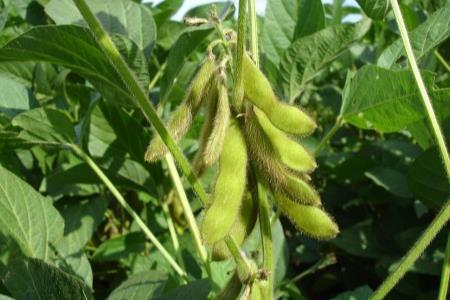Combining a bacterial isolate with rhizobia can boost soybean production without disrupting the natural soil microbiome, a new study reveals.

The paper by scientists in Brazil and Germany is entitled ‘Co-inoculation with Bacillus thuringiensis RZ2MS9 and rhizobia improves the soybean development and modulates soil functional diversity’ and was published in FEMS Microbiology Ecology in January 2025.
READ MORE: Restoring vegetation cover in Amazon’s pasture areas can reduce methane emissions, study reveals
READ MORE: Research unveils rhizobia strains effective against soybean root rot fungal pathogens
First author and Applied Microbiology International member Leandro Fonseca de Souza, Assistant Professor at the Federal University of Espirito Santo, Brazil, said the study demonstrated that combining Bacillus thuringiensis RZ2MS9 with rhizobia commonly used in soybean cultivation enhances plant growth and pod production without significantly disrupting the natural soil microbiome, even over a short culture period.
Soil functional diversity
“Additionally, when Bacillus thuringiensis RZ2MS9 was applied alone, it had a minor and temporary impact on soil functional diversity, which was quickly restored,” he said.
“We propose that this effect may be due to interference with natural microbial communication through quorum sensing, a phenomenon known as quorum quenching. These findings support the development of sustainable agricultural practices by integrating beneficial microbes to boost crop performance while maintaining soil health.”
Modern agriculture relies heavily on chemical fertilizers to enhance crop yields, but this approach comes with environmental costs, such as soil degradation and pollution. The challenge is to find biological alternatives that promote plant growth while maintaining the ecological balance of the soil microbiome.
This study aimed to determine whether the combined use of B. thuringiensis RZ2MS9 and rhizobia could enhance soybean productivity without disrupting the microbial communities that play a vital role in soil fertility.
Field experiment
To evaluate the impact of microbial inoculation, the team conducted a field experiment in Brazil in which soybeans were grown under four different treatments:
(1) inoculation with B. thuringiensis RZ2MS9
(2) inoculation with rhizobia
(3) co-inoculation with both microbes
(4) a control group without inoculation.
They monitored plant growth and changes in soil microbial taxonomic and functional diversity using metagenomic analysis.
Soybean height and pod number
The results showed that co-inoculation improved soybean height and pod number compared to the control.
Interestingly, while B. thuringiensis RZ2MS9 influenced the functional potential of the soil microbiome, overall microbial diversity and structure remained stable. Additionally, the co-inoculation enriched genes related to phosphorus cycling, which is crucial for plant nutrient uptake.
“One unexpected finding was that B. thuringiensis RZ2MS9 appeared capable to disrupt quorum sensing in the soil microbiome, which could temporarily altered its functional diversity,” Dr Souza said.
Short-term change
“However, these changes did not persist, and the microbial community recovered its original functional state after the soybean plants were harvested. This suggests that while microbial inoculants can induce short-term changes in soil functionality, they do not necessarily lead to long-term disruptions in microbial diversity.
“This study supports evidence that microbial co-inoculations can be used to enhance agricultural productivity without negatively impacting soil natural microbiome.
“By promoting soybean growth and enriching phosphorus-related microbial functions, co-inoculation with B. thuringiensis RZ2MS9 and rhizobia presents a promising alternative. This approach aligns with the goals of sustainable agriculture by improving crop yields while reducing reliance on synthetic inputs, thereby mitigating environmental impacts.”
Next steps
To build on these findings, Mr Souza suggests field trials in different soils to assess if the lasting effects are the same; investigating how different environmental conditions (e.g., soil types, climate variations) influence the effectiveness of co-inoculation; exploring additional microbial co-inoculations to improve plant growth; and examining the quorum quenching potential of B. thuringiensis RZ2MS9.
The study was led by Leandro Fonseca de Souza and Helena Gutierrez Oliveira, supervised by Maria Carolina Quecine, at the University of Sao Paulo, Brazil, and was funded by agencies FAPESP, CNPq and CAPES.
Topics
- Agriculture
- Applied Microbiology International
- Bacillus thuringiensis RZ2MS9
- Bacteria
- Community
- Federal University of Espirito Santo
- Food Security
- Healthy Land
- Helena Gutierrez Oliveira
- Leandro Fonseca de Souza
- Maria Carolina Quecine
- quorum quenching
- quorum sensing
- Research News
- rhizobia
- Soil & Plant Science
- soybeans
- The Americas
- UK & Rest of Europe
- University of Sao Paulo







No comments yet